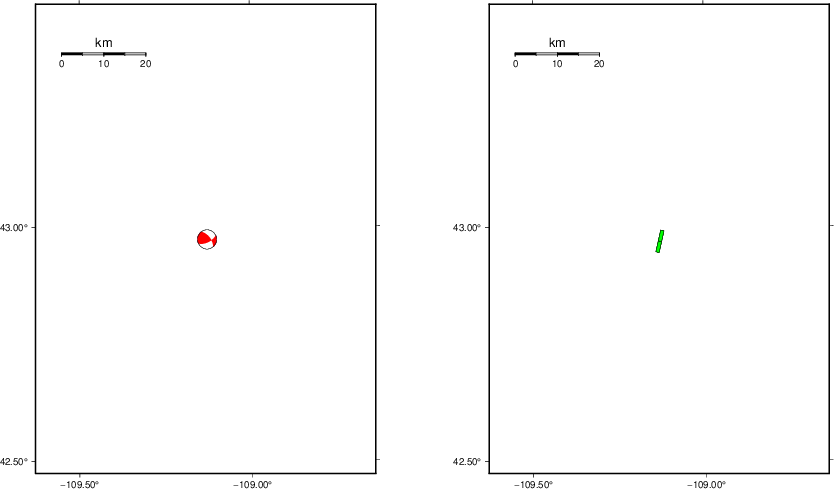Location
SLU Location
To check the ANSS location or to compare the observed P-wave first motions to the moment tensor solution, P- and S-wave first arrival times were manually read together with the P-wave first motions. The subsequent output of the program elocate is given in the file elocate.txt. The first motion plot is shown below.
Location ANSS
The ANSS event ID is usb000jx4l and the event page is at
https://earthquake.usgs.gov/earthquakes/eventpage/usb000jx4l/executive.
2013/09/21 13:16:31 42.974 -109.128 76.2 4.8 Wyoming
Focal Mechanism
USGS/SLU Moment Tensor Solution
ENS 2013/09/21 13:16:31:0 42.97 -109.13 76.2 4.8 Wyoming
Stations used:
IU.RSSD IW.DLMT IW.FLWY IW.FXWY IW.IMW IW.LOHW IW.MOOW
IW.REDW IW.RWWY IW.SNOW IW.TPAW TA.H17A TA.Q24A US.AHID
US.BOZ US.LKWY US.MSO US.RLMT WY.YHB WY.YHH WY.YHL WY.YMP
WY.YNE WY.YNR WY.YTP
Filtering commands used:
cut a -30 a 180
rtr
taper w 0.1
hp c 0.02 n 3
lp c 0.08 n 3
Best Fitting Double Couple
Mo = 1.80e+23 dyne-cm
Mw = 4.77
Z = 76 km
Plane Strike Dip Rake
NP1 65 65 30
NP2 321 63 152
Principal Axes:
Axis Value Plunge Azimuth
T 1.80e+23 38 284
N 0.00e+00 52 101
P -1.80e+23 1 193
Moment Tensor: (dyne-cm)
Component Value
Mxx -1.65e+23
Mxy -6.44e+22
Mxz 2.46e+22
Myy 9.59e+22
Myz -8.41e+22
Mzz 6.89e+22
--------------
----------------------
####------------------------
#########---------------------
##############--------------------
##################------------------
#####################-----------------
#######################---------------##
###### ################-----------####
####### T #################---------######
####### ###################-----########
##############################--##########
#############################--###########
#########################------#########
#####################-----------########
###############----------------#######
-------------------------------#####
------------------------------####
----------------------------##
---------------------------#
----- --------------
- P ----------
Global CMT Convention Moment Tensor:
R T P
6.89e+22 2.46e+22 8.41e+22
2.46e+22 -1.65e+23 6.44e+22
8.41e+22 6.44e+22 9.59e+22
Details of the solution is found at
http://www.eas.slu.edu/eqc/eqc_mt/MECH.NA/20130921131631/index.html
|
Preferred Solution
The preferred solution from an analysis of the surface-wave spectral amplitude radiation pattern, waveform inversion or first motion observations is
STK = 65
DIP = 65
RAKE = 30
MW = 4.77
HS = 76.0
The NDK file is 20130921131631.ndk
The waveform inversion is preferred.
Moment Tensor Comparison
The following compares this source inversion to those provided by others. The purpose is to look for major differences and also to note slight differences that might be inherent to the processing procedure. For completeness the USGS/SLU solution is repeated from above.
| SLU |
USGSMT |
GCMT |
SLUFM |
USGS/SLU Moment Tensor Solution
ENS 2013/09/21 13:16:31:0 42.97 -109.13 76.2 4.8 Wyoming
Stations used:
IU.RSSD IW.DLMT IW.FLWY IW.FXWY IW.IMW IW.LOHW IW.MOOW
IW.REDW IW.RWWY IW.SNOW IW.TPAW TA.H17A TA.Q24A US.AHID
US.BOZ US.LKWY US.MSO US.RLMT WY.YHB WY.YHH WY.YHL WY.YMP
WY.YNE WY.YNR WY.YTP
Filtering commands used:
cut a -30 a 180
rtr
taper w 0.1
hp c 0.02 n 3
lp c 0.08 n 3
Best Fitting Double Couple
Mo = 1.80e+23 dyne-cm
Mw = 4.77
Z = 76 km
Plane Strike Dip Rake
NP1 65 65 30
NP2 321 63 152
Principal Axes:
Axis Value Plunge Azimuth
T 1.80e+23 38 284
N 0.00e+00 52 101
P -1.80e+23 1 193
Moment Tensor: (dyne-cm)
Component Value
Mxx -1.65e+23
Mxy -6.44e+22
Mxz 2.46e+22
Myy 9.59e+22
Myz -8.41e+22
Mzz 6.89e+22
--------------
----------------------
####------------------------
#########---------------------
##############--------------------
##################------------------
#####################-----------------
#######################---------------##
###### ################-----------####
####### T #################---------######
####### ###################-----########
##############################--##########
#############################--###########
#########################------#########
#####################-----------########
###############----------------#######
-------------------------------#####
------------------------------####
----------------------------##
---------------------------#
----- --------------
- P ----------
Global CMT Convention Moment Tensor:
R T P
6.89e+22 2.46e+22 8.41e+22
2.46e+22 -1.65e+23 6.44e+22
8.41e+22 6.44e+22 9.59e+22
Details of the solution is found at
http://www.eas.slu.edu/eqc/eqc_mt/MECH.NA/20130921131631/index.html
|
Regional Moment Tensor (Mwr)
Moment
2.71e+16 N-m
Magnitude
4.9
Percent DC
45%
Depth
78.0 km
Updated
2013-09-21 15:44:17 UTC
Author
us
Catalog
us
Contributor
us
Code
us_b000jx4l_mwr
Principal Axes
Axis Value Plunge Azimuth
T 2.331 52 296
N 0.641 38 103
P -2.971 6 198
Nodal Planes
Plane Strike Dip Rake
NP1 78° 61 46
NP2 322° 51 142

|
September 21, 2013, WYOMING, MW=4.8
Meredith Nettles
Goran Ekstrom
CENTROID-MOMENT-TENSOR SOLUTION
GCMT EVENT: S201309211316A
DATA: IU II LD DK G TA US BK CI
SURFACE WAVES: 101S, 160C, T= 50
TIMESTAMP: Q-20130921162219
CENTROID LOCATION:
ORIGIN TIME: 13:16:35.5 0.2
LAT:42.99N 0.02;LON:109.12W 0.02
DEP: 82.0 3.6;TRIANG HDUR: 0.6
MOMENT TENSOR: SCALE 10**23 D-CM
RR= 0.445 0.072; TT=-2.090 0.070
PP= 1.640 0.069; RT= 0.247 0.043
RP= 0.786 0.031; TP= 0.631 0.073
PRINCIPAL AXES:
1.(T) VAL= 2.138;PLG=26;AZM=280
2.(N) 0.057; 64; 93
3.(P) -2.199; 3; 189
BEST DBLE.COUPLE:M0= 2.17*10**23
NP1: STRIKE=321;DIP=70;SLIP= 163
NP2: STRIKE= 57;DIP=74;SLIP= 21
-----------
-------------------
####-------------------
#########------------------
############----------------#
###############-------------###
## ############---------#####
### T #############------########
### ###############--##########
#####################-###########
##################-----##########
##############---------########
##########--------------#######
####--------------------#####
-----------------------####
----------------------#
------ ----------
-- P ------
|
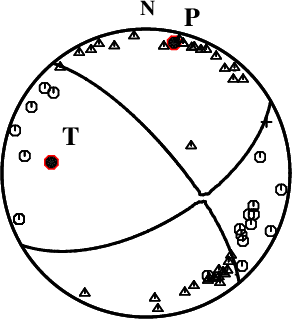
First motions and takeoff angles from an elocate run.
|
Magnitudes
Given the availability of digital waveforms for determination of the moment tensor, this section documents the added processing leading to mLg, if appropriate to the region, and ML by application of the respective IASPEI formulae. As a research study, the linear distance term of the IASPEI formula
for ML is adjusted to remove a linear distance trend in residuals to give a regionally defined ML. The defined ML uses horizontal component recordings, but the same procedure is applied to the vertical components since there may be some interest in vertical component ground motions. Residual plots versus distance may indicate interesting features of ground motion scaling in some distance ranges. A residual plot of the regionalized magnitude is given as a function of distance and azimuth, since data sets may transcend different wave propagation provinces.
ML Magnitude

Left: ML computed using the IASPEI formula for Horizontal components. Center: ML residuals computed using a modified IASPEI formula that accounts for path specific attenuation; the values used for the trimmed mean are indicated. The ML relation used for each figure is given at the bottom of each plot.
Right: Residuals from new relation as a function of distance and azimuth.

Left: ML computed using the IASPEI formula for Vertical components (research). Center: ML residuals computed using a modified IASPEI formula that accounts for path specific attenuation; the values used for the trimmed mean are indicated. The ML relation used for each figure is given at the bottom of each plot.
Right: Residuals from new relation as a function of distance and azimuth.
Context
The left panel of the next figure presents the focal mechanism for this earthquake (red) in the context of other nearby events (blue) in the SLU Moment Tensor Catalog. The right panel shows the inferred direction of maximum compressive stress and the type of faulting (green is strike-slip, red is normal, blue is thrust; oblique is shown by a combination of colors). Thus context plot is useful for assessing the appropriateness of the moment tensor of this event.
Waveform Inversion using wvfgrd96
The focal mechanism was determined using broadband seismic waveforms. The location of the event (star) and the
stations used for (red) the waveform inversion are shown in the next figure.
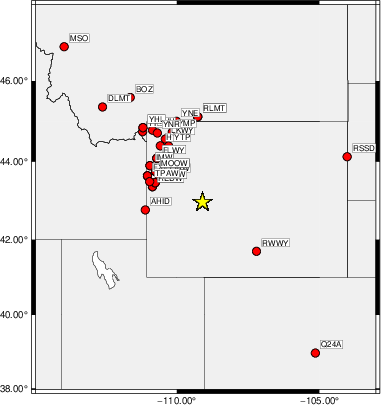
|
|
Location of broadband stations used for waveform inversion
|
The program wvfgrd96 was used with good traces observed at short distance to determine the focal mechanism, depth and seismic moment. This technique requires a high quality signal and well determined velocity model for the Green's functions. To the extent that these are the quality data, this type of mechanism should be preferred over the radiation pattern technique which requires the separate step of defining the pressure and tension quadrants and the correct strike.
The observed and predicted traces are filtered using the following gsac commands:
cut a -30 a 180
rtr
taper w 0.1
hp c 0.02 n 3
lp c 0.08 n 3
The results of this grid search are as follow:
DEPTH STK DIP RAKE MW FIT
WVFGRD96 0.5 330 60 30 3.69 0.1911
WVFGRD96 1.0 330 60 20 3.72 0.2050
WVFGRD96 2.0 330 60 25 3.83 0.2624
WVFGRD96 3.0 330 65 20 3.87 0.2761
WVFGRD96 4.0 335 70 40 3.93 0.2853
WVFGRD96 5.0 140 65 -15 3.93 0.2991
WVFGRD96 6.0 140 70 -20 3.95 0.3175
WVFGRD96 7.0 140 70 -15 3.98 0.3333
WVFGRD96 8.0 310 60 -40 4.06 0.3536
WVFGRD96 9.0 310 60 -45 4.10 0.3674
WVFGRD96 10.0 310 60 -45 4.11 0.3800
WVFGRD96 11.0 310 60 -45 4.13 0.3883
WVFGRD96 12.0 310 65 -45 4.15 0.3953
WVFGRD96 13.0 310 65 -45 4.16 0.3988
WVFGRD96 14.0 310 65 -45 4.17 0.4003
WVFGRD96 15.0 310 65 -45 4.19 0.4005
WVFGRD96 16.0 310 65 -45 4.20 0.3963
WVFGRD96 17.0 310 65 -45 4.21 0.3913
WVFGRD96 18.0 310 65 -45 4.22 0.3832
WVFGRD96 19.0 315 70 -50 4.24 0.3767
WVFGRD96 20.0 180 5 -45 4.31 0.3748
WVFGRD96 21.0 180 5 -45 4.33 0.3719
WVFGRD96 22.0 170 5 -55 4.34 0.3750
WVFGRD96 23.0 190 10 -35 4.35 0.3705
WVFGRD96 24.0 185 10 -40 4.36 0.3729
WVFGRD96 25.0 190 10 -35 4.37 0.3742
WVFGRD96 26.0 180 10 -45 4.38 0.3682
WVFGRD96 27.0 180 10 -45 4.39 0.3677
WVFGRD96 28.0 180 10 -45 4.40 0.3647
WVFGRD96 29.0 175 10 -50 4.41 0.3568
WVFGRD96 30.0 175 10 -50 4.42 0.3530
WVFGRD96 31.0 175 10 -50 4.43 0.3450
WVFGRD96 32.0 175 10 -50 4.43 0.3388
WVFGRD96 33.0 175 10 -50 4.44 0.3326
WVFGRD96 34.0 165 10 -55 4.45 0.3212
WVFGRD96 35.0 170 10 -50 4.46 0.3131
WVFGRD96 36.0 175 10 -50 4.44 0.3057
WVFGRD96 37.0 40 40 -15 4.39 0.2968
WVFGRD96 38.0 45 45 -15 4.39 0.2998
WVFGRD96 39.0 60 45 35 4.42 0.3109
WVFGRD96 40.0 70 40 45 4.54 0.3352
WVFGRD96 41.0 65 45 40 4.55 0.3456
WVFGRD96 42.0 70 40 40 4.58 0.3574
WVFGRD96 43.0 60 45 20 4.57 0.3715
WVFGRD96 44.0 60 45 20 4.59 0.3886
WVFGRD96 45.0 60 50 20 4.59 0.4049
WVFGRD96 46.0 60 50 20 4.61 0.4204
WVFGRD96 47.0 60 50 20 4.62 0.4352
WVFGRD96 48.0 65 50 25 4.64 0.4490
WVFGRD96 49.0 65 50 25 4.65 0.4623
WVFGRD96 50.0 65 50 25 4.66 0.4746
WVFGRD96 51.0 65 50 25 4.67 0.4860
WVFGRD96 52.0 65 50 30 4.69 0.4971
WVFGRD96 53.0 65 50 30 4.70 0.5083
WVFGRD96 54.0 60 55 20 4.68 0.5202
WVFGRD96 55.0 60 55 20 4.69 0.5331
WVFGRD96 56.0 60 55 20 4.70 0.5453
WVFGRD96 57.0 60 55 20 4.71 0.5567
WVFGRD96 58.0 60 60 20 4.70 0.5675
WVFGRD96 59.0 60 60 20 4.71 0.5771
WVFGRD96 60.0 60 60 20 4.72 0.5866
WVFGRD96 61.0 60 60 20 4.72 0.5952
WVFGRD96 62.0 60 60 20 4.73 0.6027
WVFGRD96 63.0 60 60 20 4.73 0.6098
WVFGRD96 64.0 60 65 25 4.73 0.6161
WVFGRD96 65.0 60 65 25 4.73 0.6218
WVFGRD96 66.0 65 60 25 4.75 0.6272
WVFGRD96 67.0 65 60 25 4.76 0.6318
WVFGRD96 68.0 65 60 25 4.76 0.6356
WVFGRD96 69.0 65 60 25 4.76 0.6393
WVFGRD96 70.0 65 60 25 4.77 0.6423
WVFGRD96 71.0 65 60 25 4.77 0.6442
WVFGRD96 72.0 65 65 30 4.76 0.6460
WVFGRD96 73.0 65 65 30 4.77 0.6479
WVFGRD96 74.0 65 65 30 4.77 0.6490
WVFGRD96 75.0 65 65 30 4.77 0.6503
WVFGRD96 76.0 65 65 30 4.77 0.6508
WVFGRD96 77.0 65 65 30 4.77 0.6500
WVFGRD96 78.0 65 65 30 4.78 0.6502
WVFGRD96 79.0 65 65 30 4.78 0.6497
WVFGRD96 80.0 65 65 30 4.78 0.6482
WVFGRD96 81.0 65 70 30 4.77 0.6474
WVFGRD96 82.0 65 70 30 4.77 0.6463
WVFGRD96 83.0 65 70 30 4.77 0.6453
WVFGRD96 84.0 65 70 30 4.77 0.6439
WVFGRD96 85.0 65 70 30 4.77 0.6417
WVFGRD96 86.0 65 70 30 4.77 0.6403
WVFGRD96 87.0 65 70 30 4.77 0.6383
WVFGRD96 88.0 65 70 30 4.77 0.6359
WVFGRD96 89.0 65 70 30 4.77 0.6343
WVFGRD96 90.0 65 70 30 4.77 0.6319
WVFGRD96 91.0 65 70 30 4.77 0.6294
WVFGRD96 92.0 65 70 30 4.78 0.6267
WVFGRD96 93.0 65 70 30 4.78 0.6246
WVFGRD96 94.0 65 70 30 4.78 0.6222
WVFGRD96 95.0 65 70 30 4.78 0.6193
WVFGRD96 96.0 65 70 30 4.78 0.6168
WVFGRD96 97.0 65 70 30 4.78 0.6142
WVFGRD96 98.0 65 70 30 4.78 0.6115
WVFGRD96 99.0 65 70 30 4.78 0.6089
The best solution is
WVFGRD96 76.0 65 65 30 4.77 0.6508
The mechanism corresponding to the best fit is
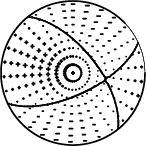
|
|
Figure 1. Waveform inversion focal mechanism
|
The best fit as a function of depth is given in the following figure:

|
|
Figure 2. Depth sensitivity for waveform mechanism
|
The comparison of the observed and predicted waveforms is given in the next figure. The red traces are the observed and the blue are the predicted.
Each observed-predicted component is plotted to the same scale and peak amplitudes are indicated by the numbers to the left of each trace. A pair of numbers is given in black at the right of each predicted traces. The upper number it the time shift required for maximum correlation between the observed and predicted traces. This time shift is required because the synthetics are not computed at exactly the same distance as the observed, the velocity model used in the predictions may not be perfect and the epicentral parameters may be be off.
A positive time shift indicates that the prediction is too fast and should be delayed to match the observed trace (shift to the right in this figure). A negative value indicates that the prediction is too slow. The lower number gives the percentage of variance reduction to characterize the individual goodness of fit (100% indicates a perfect fit).
The bandpass filter used in the processing and for the display was
cut a -30 a 180
rtr
taper w 0.1
hp c 0.02 n 3
lp c 0.08 n 3
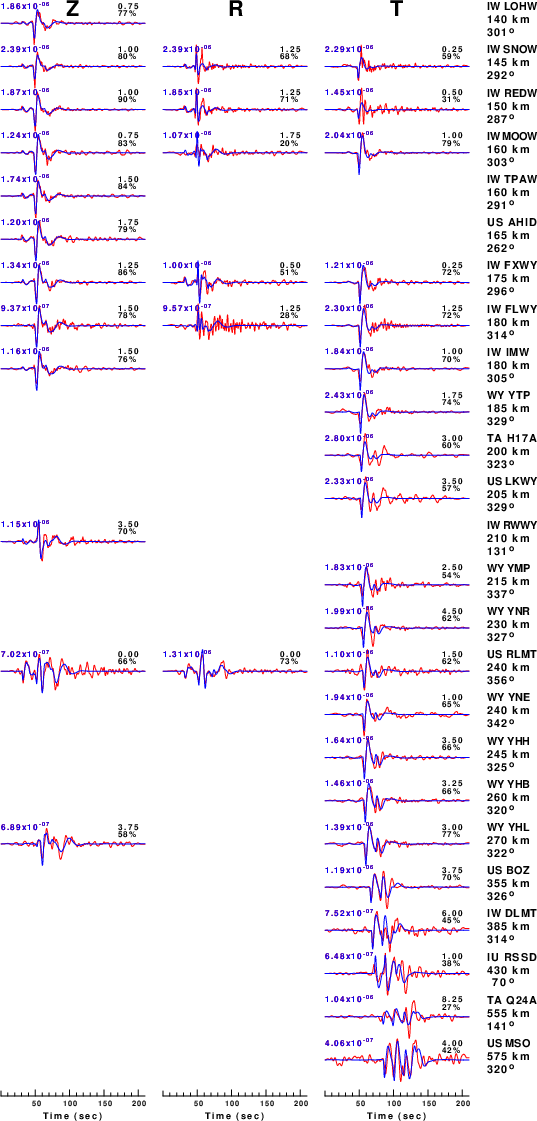
|
|
Figure 3. Waveform comparison for selected depth. Red: observed; Blue - predicted. The time shift with respect to the model prediction is indicated. The percent of fit is also indicated. The time scale is relative to the first trace sample.
|
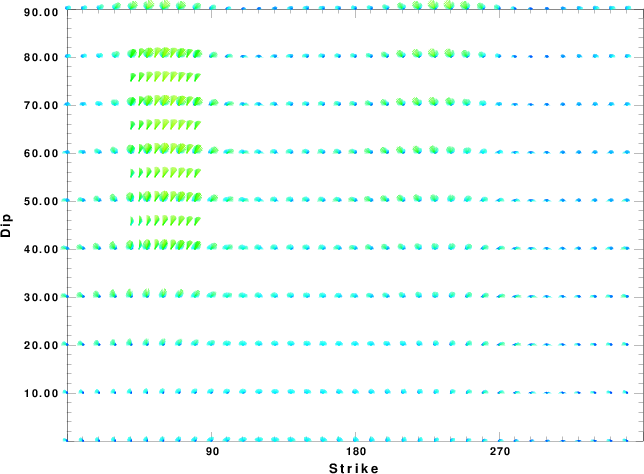
|
|
Focal mechanism sensitivity at the preferred depth. The red color indicates a very good fit to the waveforms.
Each solution is plotted as a vector at a given value of strike and dip with the angle of the vector representing the rake angle, measured, with respect to the upward vertical (N) in the figure.
|
A check on the assumed source location is possible by looking at the time shifts between the observed and predicted traces. The time shifts for waveform matching arise for several reasons:
- The origin time and epicentral distance are incorrect
- The velocity model used for the inversion is incorrect
- The velocity model used to define the P-arrival time is not the
same as the velocity model used for the waveform inversion
(assuming that the initial trace alignment is based on the
P arrival time)
Assuming only a mislocation, the time shifts are fit to a functional form:
Time_shift = A + B cos Azimuth + C Sin Azimuth
The time shifts for this inversion lead to the next figure:
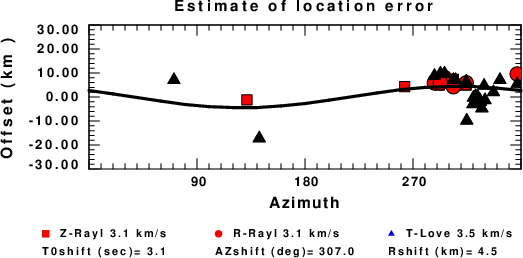
The derived shift in origin time and epicentral coordinates are given at the bottom of the figure.
Velocity Model
The WUS.model used for the waveform synthetic seismograms and for the surface wave eigenfunctions and dispersion is as follows
(The format is in the model96 format of Computer Programs in Seismology).
MODEL.01
Model after 8 iterations
ISOTROPIC
KGS
FLAT EARTH
1-D
CONSTANT VELOCITY
LINE08
LINE09
LINE10
LINE11
H(KM) VP(KM/S) VS(KM/S) RHO(GM/CC) QP QS ETAP ETAS FREFP FREFS
1.9000 3.4065 2.0089 2.2150 0.302E-02 0.679E-02 0.00 0.00 1.00 1.00
6.1000 5.5445 3.2953 2.6089 0.349E-02 0.784E-02 0.00 0.00 1.00 1.00
13.0000 6.2708 3.7396 2.7812 0.212E-02 0.476E-02 0.00 0.00 1.00 1.00
19.0000 6.4075 3.7680 2.8223 0.111E-02 0.249E-02 0.00 0.00 1.00 1.00
0.0000 7.9000 4.6200 3.2760 0.164E-10 0.370E-10 0.00 0.00 1.00 1.00
Last Changed Fri Apr 26 09:12:09 PM CDT 2024




